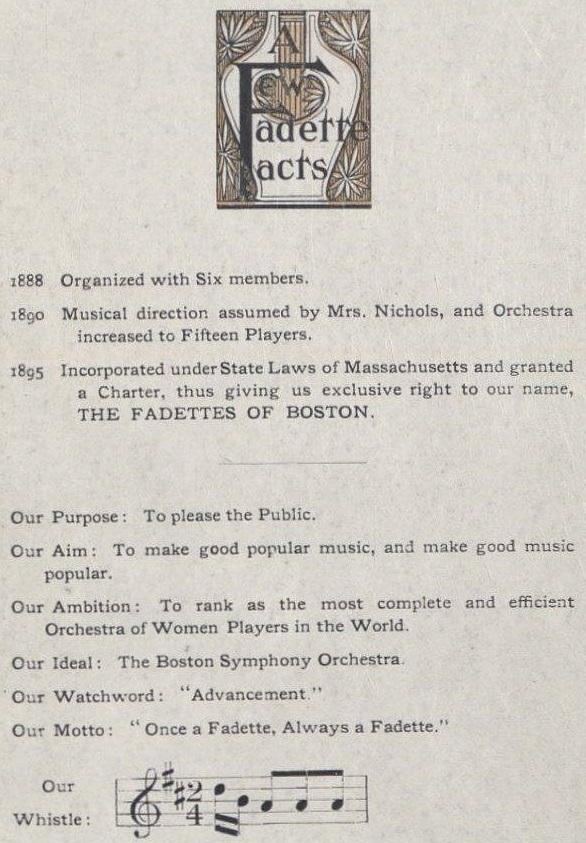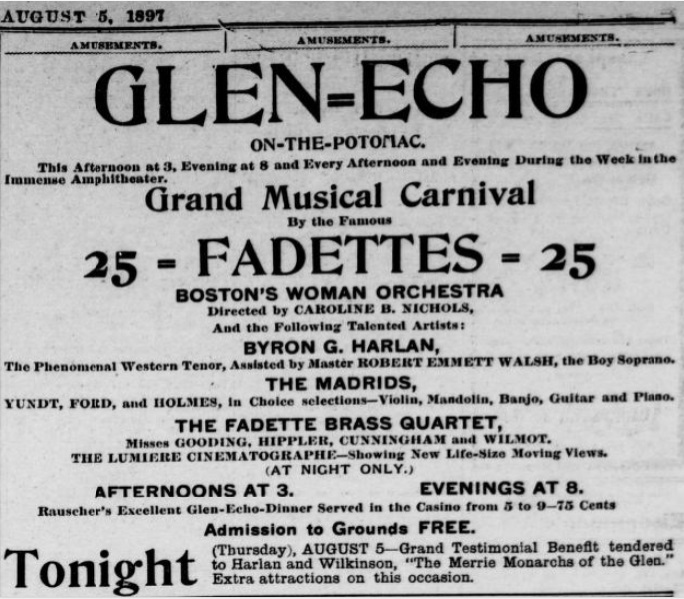A Few Fadette Facts

In 1903, Joseph A. Pasternack (1881-1940), who played viola with the Metropolitan
Opera Orchestra, composed a piano piece "The Fadettes of Boston March," which used
the five notes of the Fadettes Whistle as a motif. In 1914, Grace M. Gooding (1878-
1948), who played cornet with the Fadettes of Boston, composed a piano piece The
Fadettes Call, which also used the Fadettes Whistle as a motif. A photo of The Fadettes
Woman's Orchestra of Boston shows Grace Gooding holding her cornet. Scotch tape
across her face was to repair a tear at the right edge of the photo. A 1902-09-10 article
on the Fadettes does not list Grace Gooding in its list of active players. So this photo
with Grace Gooding in it must have been taken prior to 1902-09-10.
1897-08-05 ad in The Evening Times (Washington DC)

Notice: "THE FADETTE BRASS QUARTET, Misses GOODING, HIPPLER,
CUNNINGHAM, and WILMOT." "GOODING" was Grace M. Gooding. On
1897-08-10, only 5 days after this ad appeared in that Washington DC newspaper,
there were three Berliner recordings in Washington DC by Boston Fadettes Ladies
Brass Quartette:
_______Berliner 829 "Oh Paradise" by Joseph Barnby audio
_______Berliner 830 "Morning Serenade" by Franz Abt audio
_______Berliner 831 "Sweet and Low" by Joseph Barnby audio
So we have three recordings of Grace M. Gooding playing her cornet. On 1898-12-15,
The Scranton Tribune reported: "Mrs. Caroline B. Nichols, the leader, evidenced
striking ability. Miss Lillian Chandler, violin soloist who accompanies the orchestra,
is an artiste of the highest order. Her interpretation of 'Zigeunerweisen' was such as
to satisfy the most exacting critic. The full orchestra accompaniment was perfect. A
brass quintette comprising Misses Grace Gooding, first cornet, Fannie Young, second
cornet, Ardelle Cunningham, first horn, Cora Cunningham, second horn, and Beth
Paye, trombone, rendered 'God Guard Thee Love' by Nessler and were accorded
hearty applause." So Grace Gooding was still a "Miss" in 1898, when she was about
20 years old. In 1914, when she was about 36 years old, she composed "The Fadettes
Call." She put her maiden name on the sheet music so that people would know that
its composer was the same Grace Gooding who had played cornet with the Fadettes
of Boston. "Once a Fadette, Always a Fadette" was their motto.
It was not at all unusual for members of the Fadettes to also be able to play the piano.
On 1902-09-10, The Providence News, in its article "Remarkable Achievements of a
Woman's Orchestra" reported: "Nearly every member of the Fadettes understands
the piano, some even being brilliant performers. Mrs. Nichols claims that the best
results cannot be obtained musically unless the members study the piano and
harmony first." See the rest of this 1902-09-10 article for detailed information about
the rise to fame of the Fadettes of Boston. In its list of players, Grace Gooding is no
longer mentioned. In 1902 she would have been about 24 years old. She probably left
that traveling orchestra to get married, a perennial frustration for conductor
Caroline B. Nichols, as explained in her candid 1908-06-21 interview with Walter
Anthony, "There Is No Sex in Music."
|